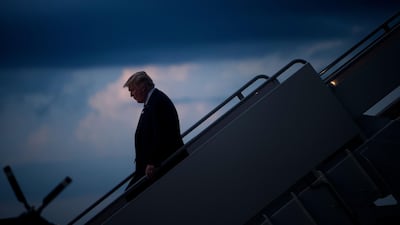Fragility in emerging markets has continued as one of the main themes of the last fortnight, culminating last eek with Argentina raising its interest rate to 60 per cent after pleading with the International Monetary Fund to accelerate the disbursement of its $50 billion (Dh183.65bn) bailout.
Of course the backdrop to such pressure remains the tightening of monetary policy in the United States, as well as the overhang of trade war fears, which are complicating already challenging domestic conditions in numerous EM countries. These strains were only alleviated slightly by the announcement of a trade deal between Mexico and the US. Both sides made concessions from their original positions, and the deal must now be ratified by both countries’ legislative bodies.
Talks with Canada are still underway, although it remains to be seen whether a deal can be reached between the US and its northern neighbour. If they cannot agree to new terms, President Trump has said he will scrap NAFTA and stick with the bilateral deal struck with Mexico. He has also threatened to withdraw from the World Trade Organisation and renewed his threats against the European Union over cars. Overshadowing all of this is the standoff between the US and China, with the US threatening to impose tariffs on another $200bn of Chinese imports.
It seems this will happen as early as this week, as progress between the two economic superpowers is unlikely to be seen until at least after the mid-term elections in November, with the chances of a deal before then low as Mr Trump continues to ramp up trade war rhetoric to fire up his political base. US politics may well now become another significant theme for markets as the mid-terms draw near.
It is now only 63 days to these elections on November 6, and the past two weeks saw the first visible sign of market vulnerability to domestic political concerns, with the markets wobbling on August 21 when the S&P 500 pulled back from record intraday highs following legal developments in Washington DC.
Mr Trump’s campaign manager Paul Manafort was found guilty of tax evasion and bank fraud, while the president’s former lawyer Michael Cohen pleaded guilty to charges including campaign finance violations, and crucially also implicated Mr Trump in this process.
These events were perhaps the first sign we have had that domestic political risk could be looming as a real threat to the markets. Indeed, Mr Trump even appeared to acknowledge the threat of impeachment when he was asked about it in an interview on Fox News when he said "If I ever get impeached, I think the market would crash. I think everybody would be very poor".
__________
Read more:
Risk of escalating emerging market pressure looms
Markets on edge amid monetary tightening and trade war uncertainty
Saudi Arabia ramps up its widening global relevance
__________
It was noticeable that what the markets reacted to were legal developments against President Trump, whereas it will most likely be the political arena that will determine whether he is impeached or whether a constitutional crisis is avoided. Legal sanctions will be very difficult to be brought against the sitting president without the political balance of power in congress shifting, which is what makes the mid-term elections so important. Without political change in Washington and across the country, the legal investigations into Mr Trump’s practises will be relatively toothless.
The impact on the markets of such uncertainty will be dictated in part by the likely implications for the key Trump policies, but not exclusively. Should the opposition Democrats take control of the House, the possibility of further tax cuts (which Mr Trump has hinted at) would surely diminish, which might indeed be taken poorly by financial markets. Further deregulation may also be open to doubt.
However, trade remains the most sensitive topic for markets at the moment, clouding the outlook for growth, and on this issue losses for Mr Trump may end up being a good thing if the trade war rhetoric fades away. An impeachment process following a swing in the house would leave Mr Trump focusing on his defence against such proceedings, rather than pursuing long-range battles abroad. Legislation may well become gridlocked in the second half of Mr Trump’s term, but more intangibly confidence in some battered US government institutions may actually start to recover should he be indicted.
This may help restore confidence that more rational decision-making could be on its way. Either way the stage is starting to be set for some critical political developments, and ones that markets cannot afford to ignore.
Tim Fox is chief economist and head of research at Emirates NBD


